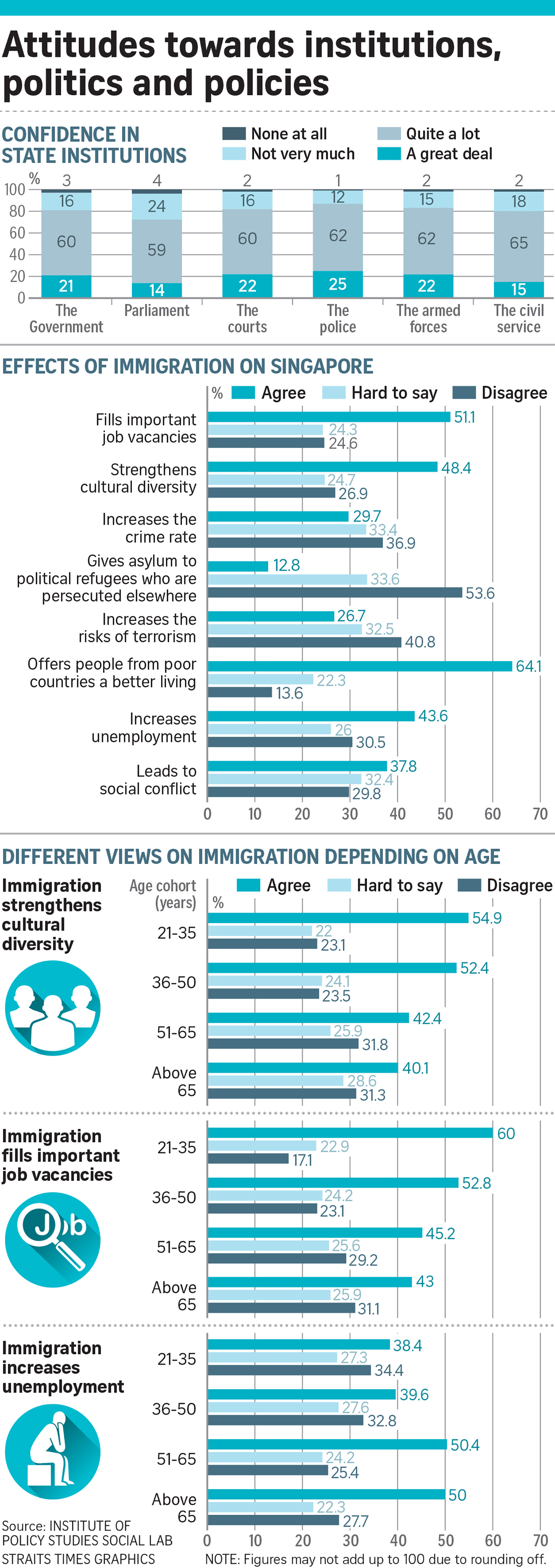High level of confidence in Govt here: Study
But almost two-thirds of Singaporeans are not interested in politics, IPS Social Lab finds
Sign up now: Get ST's newsletters delivered to your inbox
While Singaporeans have a high level of confidence in state institutions and the Government, younger and locally born citizens are less likely to feel this way, a study by the Institute of Policy Studies (IPS) Social Lab released yesterday has found.
Almost two-thirds are also uninterested in politics, the IPS learnt in examining Singaporeans' attitudes towards institutions, politics and policies.
The study is part of the World Values Survey, a global research project monitoring changing public beliefs and their socio-political impact over time across 80 societies.
The researchers had conducted face-to-face interviews with a nationally representative sample of 2,012 adult Singaporeans and permanent residents (PRs) from November 2019 to March last year.
Their responses covered four areas: public confidence or trust in Singapore's institutions; political attitudes; attitudes towards government surveillance; and attitudes towards immigration.
HIGH LEVELS OF CONFIDENCE IN STATE INSTITUTIONS
At least 70 per cent of respondents had "a great deal" or "quite a lot" of confidence in state institutions - including the Government, Parliament, courts, Singapore Police Force, Singapore Armed Forces and civil service - relative to electoral institutions, the civil society and the media.
Naturalised citizens and PRs, as well as older respondents were more likely to be confident in state and electoral institutions than locally born citizens and younger respondents.
When it came to political parties, fewer respondents indicated significant confidence (54.7 per cent) compared with those surveyed in 2012 (68.5 per cent).
"This trend may reflect opposing views of a more diverse local political scene, comprising several newly formed parties between 2012 and 2020," said the study.
In contrast, confidence in economic and academic institutions rose from 2012 to last year.
For example, while 68.8 per cent of respondents in 2012 had "a great deal" or "quite a lot" of confidence in local banks, this proportion increased to 79.4 per cent last year.
HIGH LEVEL OF CONFIDENCE IN THE GOVERNMENT
Most Singaporeans had confidence in the Government, with 21.1 per cent indicating "a great deal of confidence" and 60.4 per cent indicating "quite a lot of confidence".
Compared with 12 other societies that were chosen by IPS for this indicator, only mainland China had a higher confidence rate, with 94.9 per cent of Chinese indicating confidence in their government.
However, a lower proportion of respondents (15 per cent) from the youngest cohort aged 21 to 35, compared with those in the oldest cohort aged above 65 (28.5 per cent), indicated "a great deal of confidence" in the Government.
Only 18 per cent of locally born citizens said they had "a great deal of confidence", unlike the 35.6 per cent of naturalised citizens and PRs who chose the same option.
Also, 20.2 per cent of locally born citizens indicated "not very much confidence" or "none at all" in the Government, compared with just 9.7 per cent of naturalised citizens and PRs.
NOT INTERESTED IN POLITICS
Almost two-thirds of respondents were uninterested in politics. Those who had higher levels of interest were male, and had higher educational qualifications and income.
Compared with other selected societies, Singaporeans expressed one of the lowest levels of political interest (37.2 per cent), above only Hong Kong (30.4 per cent) and Taiwan (31.6 per cent).
In countries such as China, Australia, Sweden and Switzerland, more than 40 per cent of respondents indicated they were very interested or somewhat interested in politics.
Over nine in 10 Singaporeans believed their country is "somewhat democratic" or "democratic", and the same proportion indicated they were "somewhat satisfied" or "satisfied" with the functioning of the political system here, among the highest globally.
SUPPORT FOR GOVERNMENT SURVEILLANCE BUT NOT IN PRIVATE SITUATIONS
While close to two-thirds of those surveyed felt the Government has the right to keep people under video surveillance in public areas, they disapprove of monitoring people in private situations and without their prior knowledge.
Only slightly more than a quarter felt the Government has the right to monitor people's online activities, and more than three-quarters were against giving the Government the right to collect information about people living here without their prior knowledge.
The study noted that younger Singaporeans would be more aware of the dangers of privacy attacks and phishing, making them more sceptical of surveillance than the older generation.
"In an age of massive data harvesting, there is a greater need for state surveillance to be transparent and for the Government to tread with caution when collecting and using citizens' data," said the study.
"Successful surveillance policy execution can additionally only be realised with a healthy baseline level of public confidence in state institutions, and satisfaction with the prevailing political system."



